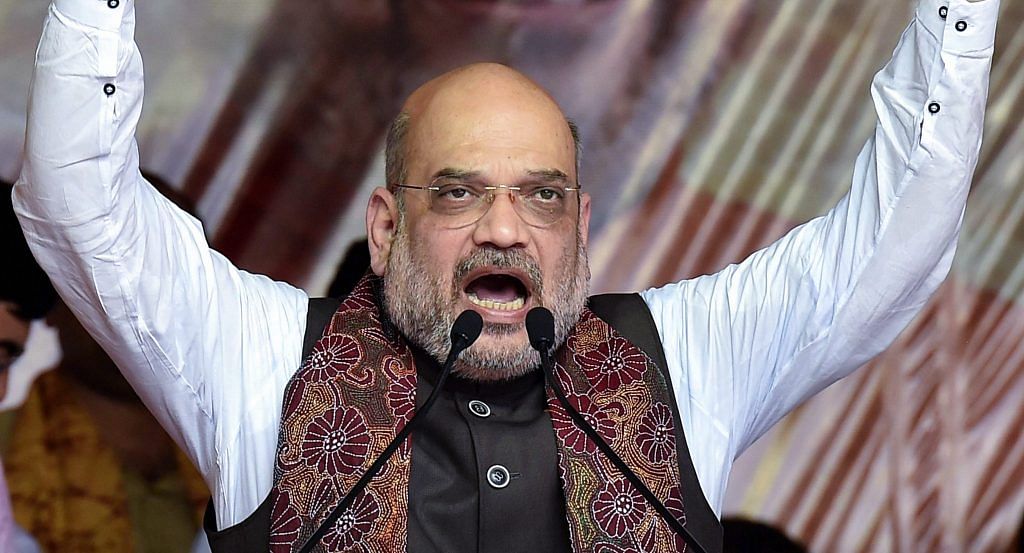Amit Shah wants every last vote and doesn’t care if his comments on Sabarimala, Ayodhya or NRC are too brazen.
BJP national president Amit Shah’s brazenly defiant comments on the Supreme Court’s Sabarimala order should not surprise anyone. This is trademark Amit Shah – confrontational, unflinchingly political and with a single-point agenda of electoral gains.
His Sabarimala comments are similar to his equally unabashed high-pitched stand on Assam’s National Register of Citizens (NRC). His shrewd tactic of political defiance of Supreme Court rulings creates the ground for potentially incendiary remarks in the run-up to state polls on Ayodhya’s Ram Mandir issue, yet another matter being heard by the apex court. A new Supreme Court bench will decide the schedule of Ayodhya hearings in January, right after the state elections.
Over the weekend, Amit Shah in Kannur pledged “rock-solid support” to those protesting against the Supreme Court order allowing women of all ages to enter the Sabarimala temple, and said governments and courts should “give orders that can be implemented”. The court, he said, should not give orders that “destroy people’s traditions”. His remarks received much flak, and many said it amounted to contempt of court.
Also read: BJP has two strategies for NRC: Moderation from ministers, belligerence from party
This, however, is hardly the first time Amit Shah has decided to breach the court’s domain with crafty electoral calculations in mind. The updating of NRC in Assam – to identify those who migrated illegally from Bangladesh after March 1971 – has been an entirely Supreme Court-monitored exercise, with the court constantly cautioning authorities to not jump the gun. In August this year, after the final NRC draft was out, the court severely reprimanded NRC state coordinator Prateek Hajela and registrar general Sailesh for talking to the media about how authorities would deal with the claims and objections filed by those left out.
“What is your authority to make such statements? What impelled you to go to the press like this?” the SC had asked.
The court’s ire, perhaps, stemmed from the fact that the NRC, being a socially and politically delicate exercise, has to be dealt with using maximum caution. But nothing stops Amit Shah from saying what he wants to, and what he believes will help mobilise his party’s Hindu majoritarian vote bank. In rallies across the country, Shah has consistently said that the BJP government would identify all “ghuspaithiye (infiltrators)” and throw them out of the country.
“I have come here to make a promise to the people of Madhya Pradesh. If you bring the BJP back to power in the 2018 state and 2019 Lok Sabha elections, the BJP government will identify and expel each infiltrator from the country,” he said in Madhya Pradesh recently. Earlier, Shah had referred to illegal Bangladeshi immigrants as “termites” and in Rajasthan last month had said his party’s government would strike off the “termites” from the voters’ list.
Also read: Modi-Shah-Bhagwat play good cop-bad cop to win 2019 elections
These are just some of the several blatant instances of Shah talking about NRC beyond the current mandate. The court has been amply clear – the exercise has to be taken forward, step by step. What would happen to those who eventually fail to be identified as Indian citizens is something neither the court nor the government has discussed yet, given the diplomatic and humanitarian aspects involved.
While the NRC officials were not spared the court’s wrath for relatively innocuous statements on the claims and objections process, Amit Shah seems to get away with his rabble-rousing. After all, he holds no position in the government – a clever, dichotomous tactic by the BJP to put forth a politically evocative party stand as well as a measured one from the government.
Amit Shah’s Sabarimala remarks, therefore, are part of the same strategy – a cautious, mature Narendra Modi-led government, coupled with a brazen, recalcitrant Shah-led party.
The belligerence on Sabarimala ruling also sets the stage for what one can expect from Amit Shah on the Ram Mandir issue in Ayodhya. Despite the matter being sub-judice, and no matter what the court says, the unstoppable Shah will make sure he raises the pitch to a note so shrill that the message of BJP’s commitment to Hindutva is drilled into his party’s target voter. The forthcoming assembly polls in five states will be a laboratory for the BJP chief’s experiments on all contentious issues before he builds on them for the 2019 elections.
Also read: Sabarimala issue- Bracing for street attacks on women or is SC order unworkable?
Effectively, this is what it means: For Amit Shah, the courts don’t quite matter. He exists in a parallel universe, built on a belligerent and indiscriminate electorally-oriented worldview. The Supreme Court can say what it wishes to – on NRC, Sabarimala, and Ayodhya – but Amit Shah will have a parallel ruling, one with the blinkered but focused agenda of getting the BJP that one extra vote.
